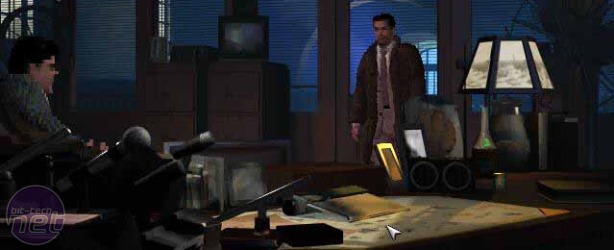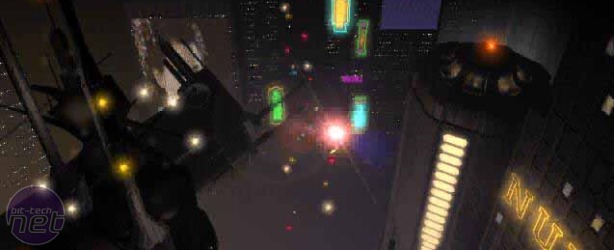
Blade Runner Retrospective
Hour Four – So far, I’ve retired one replicant, been shot dead in the same alley three bloody times, and found myself framed for murders I didn’t commit by a corrupt detective. When Blade Runner wants the game to happen, things move at a real pace.What really separates Blade Runner from other adventure games though is that you can kill and be killed. McCoy wields his weapon at all times, constantly forcing your trigger finger to stay a little itchy all the way through to one of the games 13 different conclusions.
That’s not just a hyperbolic way of putting it either, by the way. There are points in Blade Runner where you’ll find characters suddenly and mysteriously running scared, and you need to make a snap decision and judge both their motives and whether they are replicant in a few seconds. Remember, if they are a replicant then it isn’t murder, just ‘retirement’.
In an extra twist though, working out who is a replicant or not can’t easily be solved by looking at a walkthrough. Every time you start a new game then the story changes, placing characters at different points so you don’t necessarily know who or what is coming next. It's an adventure game which tweaks the story to keep things interesting over multiple plays.
The flaw of putting mortality into the mix though is that it can result in quite a few wickedly cheap deaths. Urging McCoy around a corner can end with a sudden bullet to the head and a load game screen. It’s a blatant annoyance and at points it can make the game seem eager to force you into a fire-fight rather than letting you use the much famed Voight-Kampff test.
This Voight-Kampff is one of McCoy’s main tools in Blade Runner. Just like in the film it zooms in on a suspect’s pupil and measures their responses when you ask them a series of emotionally charged questions. It’s like a lie detector, except what it’s really trying to figure out is whether the suspect is human or not.
Blade Runner’s greatest moments come when you’ve used the Voight-Kampff to successfully identify a replicant, giving you a chance to get the upper hand. The future Blade Runner depicts is deliberately impartial, enforcing no right or wrong judgements on anyone. There is no good or bad path, merely different choices. The now obvious replicant is in front of you, do you immediately retire them?
Blade Runner’s different endings take into account every movement and choice that you make, no matter how minor they seem. You can easily kill seemingly plot specific characters and happily continue. Something that just about every game ever created since neglects to include as a possibility.
And there’s so many other little things we haven’t touched on too. The Esper you can use to zoom in on photos and discover brand new evidence with. The lab manned by a policeman happy to talk you through all the evidence you’ve gathered so far, so you never miss anything. There’s such a huge amount crammed in there that, when the closing credits roll, you wonder why much more hasn’t been made of all of them.
While you’re always aware that the evidence is there to be discovered, piecing it all together is seemingly done automatically and with little in the way of exposition to keep you fully aware. At times, things seem to happen automatically, the story progressing as you click through with only a vague idea of what’s occurring. If you play as the developers intended, you'll have an informed and deep story to ponder over. If you’re stuck and start clicking in desperation then you can get lost of poorly explained conspiracies.
But that’s the point with Blade Runner; rather than simply playing to completion, you have to give yourself over and take your place within the story. Give it your all and, like the film, the game will stay with you forever.
Hour Seven – I’m not going to say who pulled the trigger or who caught the bullet with their teeth, but with a single shot, the game ends. It’s the fourth ending I’ve seen over the years, and the urge to re-watch the film grows as a result. The only reason I’m resisting that pull is because, frankly, the film doesn’t seem like enough anymore. The game has shown me I can be a part of the story, so sitting down to just watch it happen feels like settling for less. Harrison Ford isn't the Blade Runner; I am.

MSI MPG Velox 100R Chassis Review
October 14 2021 | 15:04











Want to comment? Please log in.